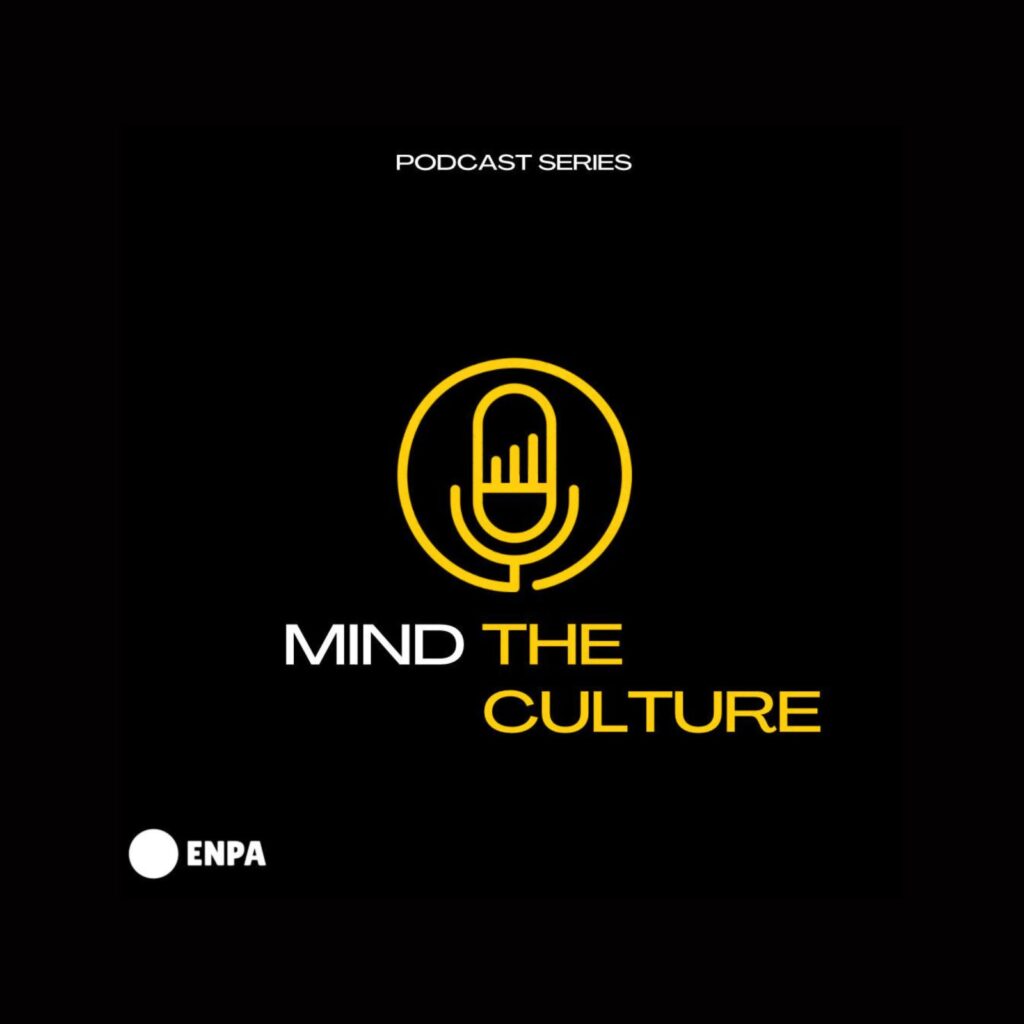The ENPA Task Force on Public Psychological Anthropology make the case for public engagement and introduce their upcoming podcast series, ‘Mind the Culture’.
“What do you think public psychological anthropology is?”, a friendly stranger was once asked at a city bus stop in Kazakhstan. They said: “Sounds like people like Margaret Mead doing podcasts”. Though humorous, their answer captured one of the core priorities of ENPA since the past year, meaning to bring the expertise and insights of psychological anthropologists into public discussions about pressing psycho-social issues.
Between anthropology & psychology
But what is psychological anthropology to begin with? While anthropology and psychology are interconnected in what they represent, with anthropology considered as ‘the study of what makes us human’ and psychology seen as ‘the study of the mind and behavior’, psychological anthropology delves into ‘the way cognition, emotion, and motivation are shaped in sociocultural settings and to the psychological factors that are important in culture learning and expression’ (Strauss, 2015) particularly through the use of methods ‘drawn from the anthropological tool kit’ (ibid). With those in mind, an attempt for psychological anthropology to engage the public cannot but be a foreseeable endeavour.
But let’s get back to where and how it all started. At the 2023 ENPA Conference in Oslo, participants collectively brainstormed future initiatives and activities for the network, with suggestions including ways for ENPA to foster different forms of public-facing scholarship. As a result of this, the Task Force on Public Psychological Anthropology was convened in November 2023, with four ENPA members – Julia Khan, Eleni Kotsira, Meghna Roy, and Sakshi Saxena – coming together to design an approach to public psychological anthropology (PPA) that is inclusive and meaningful, materialised through a series of associated PPA activities.
A very public approach to public psychological anthropology
As the Task Force got to work, however, the scope expanded from merely sharing expertise to recognising that anthropological thinking should reach far beyond university campuses or academic departments. PPA seeks to engage anyone curious about how thoughts, emotions, and behaviours are shaped by cultural contexts. While more traditional academic approaches can feel detached from everyday concerns, PPA serves as a bridge, transforming complex ideas into practical tools and relatable knowledge that help people understand themselves and the world around them.
At its core, PPA creates space and language for exploring the “in-between” experiences of life—those lived realities that fall outside conventional disciplinary frameworks or dominant public narratives. By combining psychological insights with cultural phenomena, PPA empowers both scholars and the public to engage in meaningful conversations about topics often overlooked. These might include the mental health challenges stemming from neoliberal workplace dynamics, healing practices that transcend the binary of traditional versus modern medicine, and other complex issues that demand fresh, nuanced approaches.

There are clear advantages to engaging scholars and the public in such meaningful conversations, which, in the long run, also bear the potential to reshape academic research and outputs. On the one hand, the public can get more deeply involved with how research is designed and conducted, thus enabling collaborative approaches, such as co-production and peer research. On the other hand, research findings are made more accessible to a wider audience, from non-specialists and the general public, inviting their critical thinking and feedback, to policy- and decision-makers, allowing for the application of findings and extracting lessons learnt and actionable recommendations.
In the end, PPA is far more than “Margaret Mead doing podcasts”. It draws on diverse public expertise to address real-life social and psychological challenges. Through a variety of formats—talks, writing, and multimedia platforms —it invites everyone to join and contribute to the conversation. The goal is not only to offer rich and multidisciplinary perspectives but also to inspire reflection on the systems we navigate, the societies we shape, and the lives we lead. Ultimately, PPA aspires to make the depth and richness of psychological anthropology accessible and applied, fostering dialogue that resonates across the spectrums of the scholarly and the everyday.
So, what’s next?
On this year’s World Anthropology Day, on 20 February 2025, the Taskforce will be releasing its first PPA activity, an ENPA-sponsored podcast series. Titled ‘Mind the Culture’ and consisting of four episodes hosted by the Taskforce members, the series delves into the intersection of the sociocultural and the psychological, offering insights from an eclectic mix of experts. Whether you’re passionate about big questions such as the meaning of life, or everyday matters like the contemporary workplace, there is something here for you. Stay tuned for an episode a month in the next four months and engaging conversations coming your way, with the first episode on February 20th being an ENPA special, discussing the significance of psychological anthropology as a critical public endeavour.
Do make sure you also watch this space as the Taskforce releases more outputs and resources throughout the year, dedicated to exploring the world through the lens of psychological anthropology!

Want to get involved?
Have a PPA idea to share with the Task Force, or would you like to contribute to forthcoming PPA activities? Then do reach out to Dr Julia Khan (leel-han@yandex.kz) and Dr Eleni Kotsira (helena.kotsira@gmail.com).
AUTHOR BIOS (in alphabetical order)
Julia Khan

Julia Khan recently earned a PhD in Cultural Anthropology from Seoul National University and an MBA in Counseling from the Russian Institute of Practical Psychology. She is a member of the Kazakhstan Sociology Lab and the Principal Investigator for projects on child development under the Kazakhstan Education Foundation, El Umiti. Julia is interested in how global discourses on mental health, selfhood, and relationships shape educational practices and national policies in the post-Soviet region.
Eleni Kotsira

Eleni Kotsira holds a PhD in Social Anthropology from the University of St Andrews (UK) and is an Associate Fellow of the Higher Education Academy (UK). Since March 2021, she works as a Senior Social Researcher at Alma Economics, an organisation advising governments and charities on policies and services to help the most vulnerable. Eleni is also a poetry editor with Otherwise Magazine. You can find out more about Eleni’s research and professional expertise from her website: https://elenikotsira.wordpress.com/
You can also read her writing blog at: https://poetic-movements.blogspot.com/
Meghna Roy

Meghna Roy is Doctoral Fellow at the Department of Social Anthropology, University of Oslo. She is a participant in the comparative ethnographic project Shrinking the Planet, which seeks to understand the global expansion of psychotherapy. Her ethnographic fieldwork in Bengaluru, India explores new middle-class subjectivities through participant observation at a counselling training programme. She is interested in the affective dimension of social mobility and epistemologies of psy-disciplines. Twitter: @meganthroy
For more details: https://www.sv.uio.no/sai/english/people/aca/meghnar/index.html

Leave a Reply